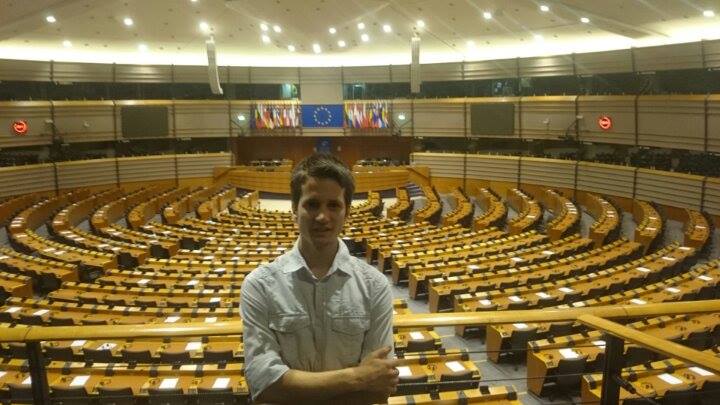Dušan Kondić is a third year political science student at the Faculty of Political Sciences in Banja Luka. He has participated in numerous seminars, conferences and similar forms of non-formal education, including the “Academy for Political Leaders of BiH” where he was selected as Scholar of the Generation. Together with colleagues from the university he took part in a visit to EU House in Sarajevo, and as faculty representative participated in the debating competition of the ‘EU and You’ programme. Along with a colleague, he won the competition, and was rewarded with a trip to Brussels, which included visits to various EU institutions.
Thanks to the “EU and You” in the past four months more than 500 students from all over the country have visited the EU House in Sarajevo, where they discussed the perspective of Bosnia and Herzegovina in the EU, asked numerous questions, and explored opportunities for active involvement in the process of European integration with officials from the European Union. How did you decide to participate in this programme, and why?
I believe that to be a young person is not only to be concerned with formal education, but also to focus on those forms of informal education that can deepen and expand existing knowledge and give new light to some issues with which young people are engaged. Since I study political science, and the EU is an important player and factor in the political life of (almost) all European – and a large number of non-European – countries, I decided to use this opportunity to gain first-hand insights from the representatives of the EU in BiH and find some answers to questions that I had. For me participation was a logical choice.
What did you learn during your visit to EU House in Sarajevo?
I cannot say that during the visit I learned something new. It is more correct to say that the information I obtained during the visit confirmed particular beliefs and attitudes that I already had, such as that the key focus should not be on what the EU and its representatives will bring or do for BiH and its entities (which, of course, is not irrelevant), but that the main question has to be what we as citizens, and political elites as our representatives, can do to make a positive impact upon economic and socio-political stability.
After 12 half-day visits to EU House in Sarajevo, 22 students participated in the debate competition, which was held from 3rd to 4th June. Why do you think that your team finished as one of the winners?
I think the key thing that allowed my teammate Tatjana and I to win the debate competition was the fact that we were just that throughout the competition – a team! Of course, preparing for the debate, attempting to predict which issues would be raised, and determining the best ways to answer them, combined with the knowledge that we demonstrated had a significant impact on the final result, but I think that this alone would not be enough if we, instead of working as a team, had acted as competition to one another.
After the EU debate competition, you travelled, along with 16 other students, to Brussels, the capital of the European Union. What were your experiences of this city, and what was the programme of the visit?
The first thing I say when someone asks me about my experiences from Brussels is that it is one ‘political city’ (without any negative overtones – to the contrary!), bearing in mind that often on the street one can hear phrases such as ‘decision making’. Of course, this is a logical consequence of the fact that it is the ‘capital’ of the European Union, the town where decision making is done for a huge number of issues that the employees of EU institutions face on a daily bases. The programme included a visit to DG NEAR, the European Parliament and AEGEE, one of Europe’s largest non-profit student organizations. Through discussions with representatives of these institutions I became familiar with their work, the goals they pursue, the influence they seek to achieve in BiH, and what opportunities students have in these (and other) EU institutions.
Did this experience encourage you to continue your participation in EU projects for young people?
Absolutely! On the one hand, these projects represent the opportunity for me, as a future political scientist, to gain practical experience on topics which are only approached in theory within my studies, thus allowing me to actively work on my own professional development. On the other, such issues are very dynamic and therefore interesting.

